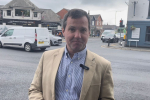
Step by slow step, England is emerging from the pandemic lockdown restrictions. It feels as though every incremental stage in our return to normality is taken at a glacial pace but the Prime Minister is determined that we do so in a way that ensures that we do not have to return to another phase of lockdowns and other restrictions.
He knows that every lockdown damages business, disrupts children’s education and contributes to an ever-increasing hospital waiting list. He has to balance the needs of controlling the Covid-19 disease with so many other priorities that society has.
Next door, in Bolton, we have seen a significant rise in the transmission of the ‘Indian Variant’ mutant strain of the coronavirus. There are many thousands of variants and every so often the media fixates on one of them. The Brazilian and South African variants seem to have fizzled out without too much impact and it is looking increasingly likely that, after some worries, the Indian variant is going to go the same way.
In fact, like all of the previous variants, the media and political narrative, which seeks to build up our fear that this variant will be the one that takes us right back to the beginning of the Coronavirus Pandemic, is unfounded.
There has been a slight increase in the numbers of people in the Royal Bolton Hospital, but it now looks like everything is under control. The Government surged the testing and vaccination programmes and even deployed the army to ensure that Bolton Council had all the resources it needed.
There has been much talk of the people of Bolton rising up against the threat of another local lockdown but, by the local and national government working hand in hand with the health agencies, the situation is under control and no local lockdown is needed.
In all likelihood, if a local lockdown had been imposed, huge numbers of people from Bolton would have headed to the shops and pubs in Wigan, Chorley and Leigh unless the police and army had blockaded the roads. People rightfully believe that they have played their part in this national crisis and now want to see the Government and Prime Minister leading us out of these restrictions.
We know that local lockdowns do not work which is why I worked with James Grundy MP in his efforts to have the Wigan Borough taken out of the one that was imposed upon Greater Manchester. Even then, some people were heading over the border for a pint.
I am increasingly confident that Boris Johnson is focused on ensuring that the 21st June really is the day that he can set the course for recovery. Boris’ British Bounce Back should see our recovery bloom and this will be a testament to the work of so many right across our society.
As a former engineer who worked for AstraZeneca, I know of the talent of the scientists who worked with the University of Oxford team to deliver our game changing vaccine. The council workers, health workers, shop keepers and so many more have really made the difference in this national effort.
Obviously, following 21st June, the health services will be monitoring for any return of Covid-19 but I am sure that they will have shifted their focus more to catching up with all of the other conditions that need the attention of our doctors and nurses.
The backlog for our hospitals is now nearly five million and 400,000 people have been waiting for over a year for their treatment. It is going to be a huge national effort to catch up, whilst ensuring children make up for lost time and the economy bounces back to pay for everything: the Covid-19 crisis has cost nearly £400 billion and counting.
Culture has taken a huge knock as has our professional and amateur sports. What better way to mark a return to normality than us having our stadia fully open to welcome fans from all over to the Rugby League World Cup in the Autumn?
This is something I am sure the Prime Minister can get behind.


